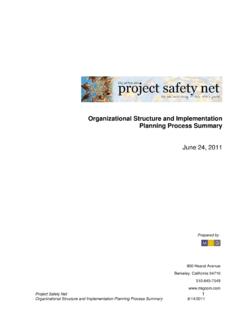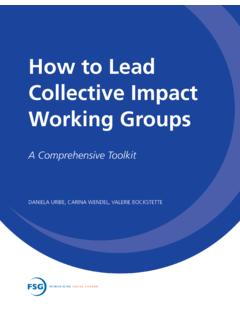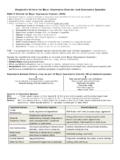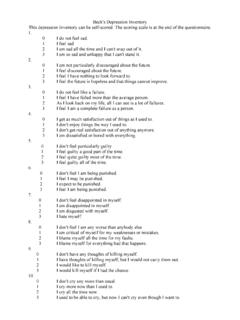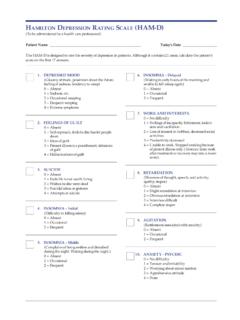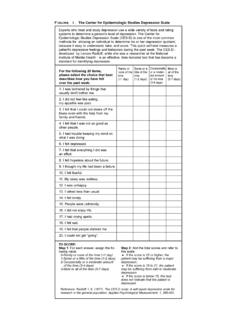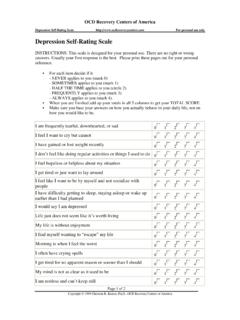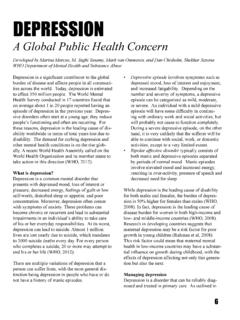Transcription of Diagnostic Criteria for Major Depressive Disorder …
1 Diagnostic Criteria for Major Depressive Disorder and Depressive Episodes DSM-IV Criteria for Major Depressive Disorder (MDD). Depressed mood or a loss of interest or pleasure in daily activities for more than two weeks. Mood represents a change from the person's baseline. Impaired function: social, occupational, educational. Specific symptoms, at least 5 of these 9, present nearly every day: 1. Depressed mood or irritable most of the day, nearly every day, as indicated by either subjective report ( , feels sad or empty) or observation made by others ( , appears tearful). 2. Decreased interest or pleasure in most activities, most of each day 3. Significant weight change (5%) or change in appetite 4. Change in sleep: Insomnia or hypersomnia 5. Change in activity: Psychomotor agitation or retardation 6. Fatigue or loss of energy 7.
2 Guilt/worthlessness: Feelings of worthlessness or excessive or inappropriate guilt 8. Concentration: diminished ability to think or concentrate, or more indecisiveness 9. Suicidality: Thoughts of death or suicide, or has suicide plan DSM V proposed (not yet adopted) anxiety symptoms that may indicate depression: irrational worry, preoccupation with unpleasant worries, trouble relaxing, feeling tense, fear that something awful might happen. Screen for conditions that may mimic or co exist with Major Depressive Disorder : Substance abuse causing depressed mood (eg. drugs, alcohol, medications). Medical illness causing depressed mood Other psychiatric disorders: mania, hypomania, bipolar, schizoaffective, schizophrenia, etc. Bereavement unless sx persist for > two months or show marked functional impairment, morbid preoccupation with worthlessness, suicidal ideation, psychotic symptoms, or psychomotor retardation.
3 Depressive Episode Criteria (may be part of Major Depressive Disorder OR an isolated episode). A B. Depressed Mood Reduced self esteem and confidence Loss of interest and enjoyment in usual activities Ideas of guilt and unworthiness Reduced energy and decreased activity Pessimistic thoughts Disturbed sleep Diminished appetite Ideas of self harm Severity of Depressive Episode: Mild: > 1 from column A plus 1-2 from column B. Or 5-6 sx but mild in severity and functional impairment. Moderate: > 1 from column A plus 2-3 from column B. Or 7 8 sx but moderate functional impairment. Severe: All 3 from column A plus > 3 from column B. Or fewer sx but any of these: severe functional impairment, psychotic sx, recent suicide attempt, or has specific suicide plan or clear intent. Functional Domain Moderately Impaired Severely Impaired Family Quiet, negative and oppositional Withdrawn, won't talk, brusque, angry, aggressive Relationships Grades/work performance Failing performance, missing school or work, School & deteriorating, missing/cutting class or doesn't care about work, oppositional, Academics / Work work, decreased effort, moderate argumentative, high academic or work stress academic or work stress Decreased socializing or extracurricular Isolated, discontinued extracurricular activities, Peer Relationships activities , more time on computer excessive computer time Stress Level, Minimizes or denies issues, projects Withholds feelings, won't talk Anxiety onto others or blames others Suicidal Ideation Vague/occasional Frequently considered, has a plan.
4 Or prior attempt Other Self Harm Occasional thoughts but no attempts Cutting, other self injury

